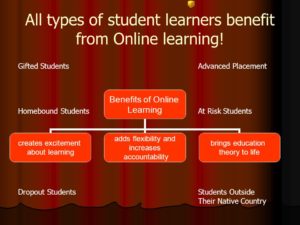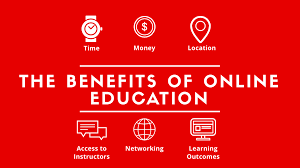- Properly deployed, online learning can more effectively connect learners with learning resources to optimize a learner center focused curricula.
- Online learning can connect stakeholders more effectively with content and each other for productive and collaborative interaction. Self, peer, formative and summative assessment can be more easily affected.
- It is now commonly agreed on that educational benchmarks and expectations can be achieved equally well, and in some cases better with online learning, than with traditional face-to-face courses. (Carruth & Carruth, 2012)

- “The online learning environment allows students with unique educational needs to work at their own pace within parameters, giving them time to progress faster in subjects at which they excel, while spending more time on subjects and lessons where they need more help.” (Press release: Insight school of kansas students head back to school, 2017)
- Learners need to learn to learn online. Online learning needs to be more proactively blended into mainstream learning solutions to optimize learner’s familiarity with its utility. “The only man who is educated is the man who has learned how to learn […] how to adapt and change […]. Changingness, a reliance on process rather than upon static knowledge, is the only thing that makes any sense as a goal for education in the modern world.” (Kirschenbaum, 2002, p.304)
- When online learning takes over significant parts of transferring intellectual information (facts, ideas, concepts, principles, some application and problem solving), in classroom and face-to face time with teachers can be reduced and/or spent on problem solving and application dialogue to develop knowledge and skills relevant to learning objectives. (Motschnig-Pitrik, Mallich, 2004)
REFERENCES
Carruth, P. J., & Carruth, A. K. (2012). Using eLearning to build workforce capacity among business professionals. American Journal of Business Education (Online), 5(6), 709-n/a.
Kirschenbaum, V., & Henderson, L. (2002). The Carl Rogers Reader, chapter 21 “The Interpersonal Relationship in the Facilitation of Learning.” p.304.
Motschnig-Pitrik, R., & Mallich, K. (2004). Effects of person-centered attitudes on professional and social competence in a blended learning paradigm. Journal of Educational Technology & Society, 7(4) Retrieved from https://search.proquest.com/docview/1287054234
Press release: Insight school of kansas students head back to school. (2017, Aug 10). Dow Jones Institutional News Retrieved from https://search.proquest.com/docview/1927840233
